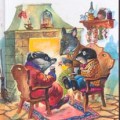Chapter 2 (Part 1)
The Open Road
'Ratty,' said the Mole suddenly, one bright summer morning, 'if you please, I want to ask you a favour.' The Rat was sitting on the river bank, singing a little song. He had just composed it himself, so he was very taken up with it, and would not pay proper attention to Mole or anything else. Since early morning he had been swimming in the river, in company with his friends the ducks. And when the ducks stood on their heads suddenly, as ducks will, he would dive down and tickle their necks, just under where their chins would be if ducks had chins, till they were forced to come to the surface again in a hurry, spluttering and angry and shaking their feathers at him, for it is impossible to say quite ALL you feel when your head is under water. At last they implored him to go away and attend to his own affairs and leave them to mind theirs. So the Rat went away, and sat on the river bank in the sun, and made up a song about them, which he called
'Ducks' Ditty.' All along the backwater, Through the rushes tall, Ducks are a-dabbling, Up tails all! Ducks' tails, Drakes' tails, Yellow feet a-quiver, Yellow bills and out of sight, Busy in the river! Slushy green undergrowth, Where the roach swim-Here we keep our larder, Cool and Full and Dim. Everyone for what he likes! We like to be Heads down, tails up, Dabbling free! High in the blue above swifts swirl and call-we are down a-dabbling. Up tails all!
'I don't know that I think so very much of that little song, Rat,' observed the Mole cautiously. He was no poet himself and didn't care who knew it; and he had a candid nature. 'Nor don't the ducks neither,' replied the Rat cheerfully. 'They say, "Why can't fellows be allowed to do what they like when they like and as they like, instead of other fellows sitting on banks and watching them all the time and making remarks and poetry and things about them? What nonsense it all is!" That's what the ducks say.' 'So it is, so it is,' said the Mole, with great heartiness. 'No, it isn't!' cried the Rat indignantly.
'Well then, it isn't, it isn't,' replied the Mole soothingly. 'But what I wanted to ask you was, won't you take me to call on Mr. Toad? I've heard so much about him, and I do so want to make his acquaintance.' 'Why, certainly,' said the good-natured Rat, jumping to his feet and dismissing poetry from his mind for the day. 'Get the boat out, and we'll paddle up there at once. It's never the wrong time to call on Toad. Early or late he's always the same fellow. Always good-tempered, always glad to see you, always sorry when you go!' 'He must be a very nice animal,' observed the Mole, as he got into the boat and took the sculls, while the Rat settled himself comfortably in the stern. 'He is indeed the best of animals,' replied Rat. 'So simple, so good-natured, and so affectionate. Perhaps he's not very clever-we can't all be geniuses; and it may be that he is both boastful and conceited. But he has got some great qualities, has Toady.' Rounding a bend in the river, they came in sight of a handsome, dignified old house of mellowed red brick, with well-kept lawns reaching down to the water's edge. 'There's Toad Hall,' said the Rat; 'and that creek on the left, where the notice-board says, "Private. No landing allowed," leads to his house-boat, where we'll leave the boat. The stables are over there on the right. That's the banqueting-hall you're looking at now-very old, that is. Toad is rather rich, you know, and this is really one of the nicest houses in these parts, though we never admit as much to Toad.' They glided up the creek, and the Mole slipped his sculls as they passed into the shadow of a large house-boat. Here they saw many handsome boats, slung from the cross beams or hauled up on a slip, but none in the water; and the place had an unused and a deserted air.
The Rat looked around him. 'I understand,' said he. 'Boating is played out. He's tired of it, and done with it. I wonder what new fad he has taken up now? Come along and let's look him up. We shall hear all about it quite soon enough.' They disembarked, and strolled across the gay flower-decked lawns in search of Toad, whom they presently happened upon resting in a wicker garden-chair, with a pre-occupied expression of face, and a large map spread out on his knees.

